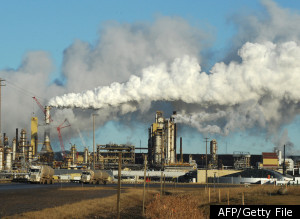EDMONTON - The Alberta government says it will review the health of people in two aboriginal communities deep in the heart of the oilsands region.
The Fort McKay First Nation and the Fort McKay Metis Nation are downriver from Fort McMurray and are surrounded by more than a dozen oilsands projects.
Community leaders requested the review, which is expected to look at how healthy people are now and what may be affecting their well-being, including diet and lifestyle. Gauging the possible health effects of the oilsands will also be key.
"Obviously the impact of the oilsands is a huge factor in the community of Fort McKay. In every direction there are oilsands around us," Ron Quintal, president of the Metis community, said Thursday.
"Fort McKay is the most impacted community in the entire country when it comes to oil and gas being around."
The plan outlined in a letter of intent calls for identifying health issues of concern and coming up with programs to deal with them.
The government says it will be up to the 700 people in the two communities to decide what the review will focus on, how it will work and when it will begin.
Alberta Health says the terms of reference have not been worked out and the review will be done in collaboration with community leaders.
Health Minister Gene Zwozdesky was unavailable for comment.
Raymond Powder, deputy chief of the Fort McKay First Nation, said their community leaders have been calling for an assessment for quite some time.
"We need to better understand the state of our people's health and how the environment around us is impacting our health — not just physically, but also emotionally and spiritually," he said in a news release.
Five years ago, some people in Fort Chipewyan further downstream from the oilsands complained of ill health and elevated cancer rates.
Alberta Health Services reported in 2009 that two cases of a rare form of bile duct cancer had been found in Fort Chipewyan between 1995 and 2006 — not six cases as initially reported by a physician in the community.
Alberta's chief medical health officer and the Royal Society of Canada found insufficient evidence to link the cancer to oilsands operations.
Alberta Health says it is continuing to work with aboriginal leaders in Fort Chipewyan to set up a health review.
The province says aboriginal people are benefiting economically from the oilsands. It estimates that more than 1,600 aboriginals have permanent oilsands jobs, not including construction work.
It also notes that the Fort McKay Group of companies, owned by the Fort McKay First Nation, works extensively with oilsands corporations and earns more than $100 million in annual revenue.
Quintal said he hopes that Health Canada will be involved in the Fort McKay health assessment.
Origin
Source: Huffington
The Fort McKay First Nation and the Fort McKay Metis Nation are downriver from Fort McMurray and are surrounded by more than a dozen oilsands projects.
Community leaders requested the review, which is expected to look at how healthy people are now and what may be affecting their well-being, including diet and lifestyle. Gauging the possible health effects of the oilsands will also be key.
"Obviously the impact of the oilsands is a huge factor in the community of Fort McKay. In every direction there are oilsands around us," Ron Quintal, president of the Metis community, said Thursday.
"Fort McKay is the most impacted community in the entire country when it comes to oil and gas being around."
The plan outlined in a letter of intent calls for identifying health issues of concern and coming up with programs to deal with them.
The government says it will be up to the 700 people in the two communities to decide what the review will focus on, how it will work and when it will begin.
Alberta Health says the terms of reference have not been worked out and the review will be done in collaboration with community leaders.
Health Minister Gene Zwozdesky was unavailable for comment.
Raymond Powder, deputy chief of the Fort McKay First Nation, said their community leaders have been calling for an assessment for quite some time.
"We need to better understand the state of our people's health and how the environment around us is impacting our health — not just physically, but also emotionally and spiritually," he said in a news release.
Five years ago, some people in Fort Chipewyan further downstream from the oilsands complained of ill health and elevated cancer rates.
Alberta Health Services reported in 2009 that two cases of a rare form of bile duct cancer had been found in Fort Chipewyan between 1995 and 2006 — not six cases as initially reported by a physician in the community.
Alberta's chief medical health officer and the Royal Society of Canada found insufficient evidence to link the cancer to oilsands operations.
Alberta Health says it is continuing to work with aboriginal leaders in Fort Chipewyan to set up a health review.
The province says aboriginal people are benefiting economically from the oilsands. It estimates that more than 1,600 aboriginals have permanent oilsands jobs, not including construction work.
It also notes that the Fort McKay Group of companies, owned by the Fort McKay First Nation, works extensively with oilsands corporations and earns more than $100 million in annual revenue.
Quintal said he hopes that Health Canada will be involved in the Fort McKay health assessment.
Origin
Source: Huffington

No comments:
Post a Comment